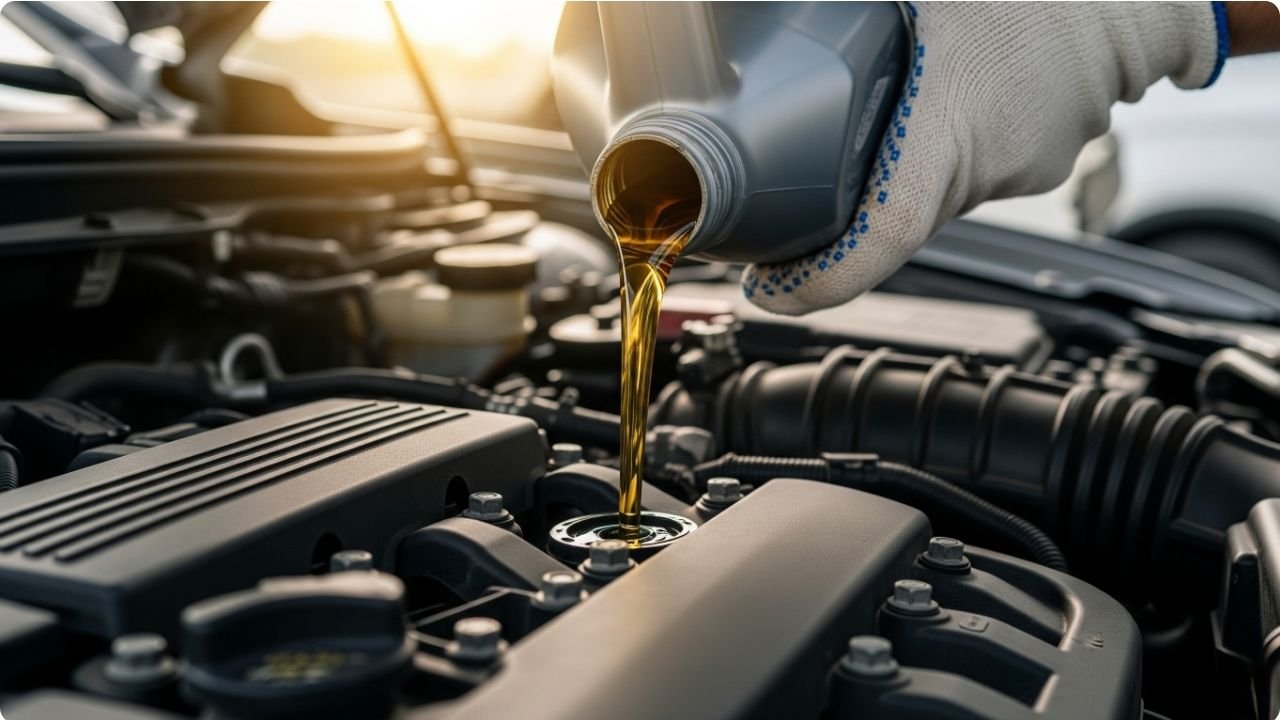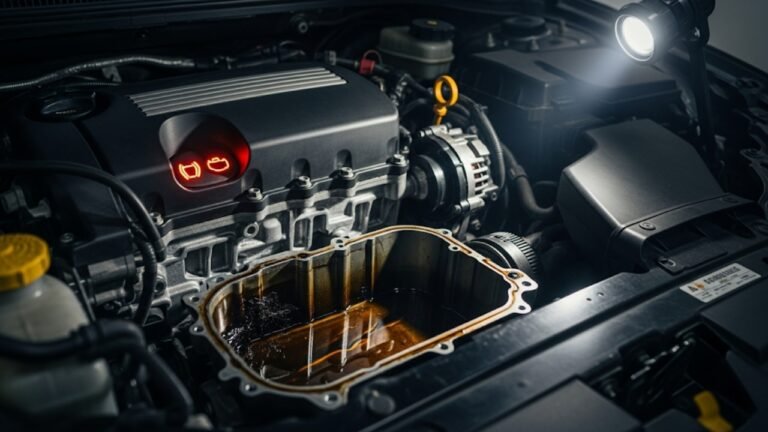What Is the Oil in a Car For?

Have you ever thought about what is the oil in a car for? Most of us just know we need to get it changed every few months, but we don’t always understand why. I used to be the same. I thought car oil was just another upsell the mechanic throws in. But after learning what it really does, I now treat it like the lifeblood of my car.
In this article, I’ll break down why car oil matters, how it keeps your engine healthy, and why skipping an oil change could cost you way more than you think. I’ll share some stories, simplify the science, and help you feel confident next time you’re in the driver’s seat. If you’ve ever asked yourself, “what is the oil in a car for?”, you’re about to find out—clearly, simply, and in a way that makes total sense.
The Brain of the Engine Is the ECU, but Oil Is the Heart

Without it, metal parts would grind together, heat up, and eventually break. But when oil is doing its job, everything flows smoothly. It’s the unsung hero that lets your car run for years without falling apart.
Imagine this: you’re on a long drive through the countryside. The sun is out, music is playing, windows are down. Your car is humming along. But inside the engine, there are thousands of tiny explosions happening every minute. That kind of power needs control, and that’s where oil steps in—like a calm force in the middle of all that chaos.
Five Key Functions of Engine Oil: More Than Just Lubrication
We often hear “oil lubricates your engine.” True. But that’s just the beginning. Let’s look at what the oil in a car is for, beyond just smooth movement:
| Function | Description |
|---|---|
| Lubrication | Reduces friction between metal parts |
| Cooling | Absorbs heat from engine parts and carries it away |
| Cleaning | Traps dirt and debris to keep the engine clean |
| Sealing | Fills small gaps between engine parts, preventing leaks |
| Protection | Coats surfaces to prevent corrosion and wear |
Real-Life Example
My cousin once drove over 10,000 miles without changing his oil. One day, the engine started knocking like a drum solo gone wrong. Turns out, the oil had turned to sludge. The engine was cooked. A simple $40 oil change could’ve saved him a $2,000 repair.
So, yes—car oil matters.
How Oil Handles the Heat: A Story of Friction and Fire
Here’s something people don’t always realize: your car engine gets hot—really hot. In fact, it can reach up to 250°F (120°C) during normal driving. That’s enough to fry an egg. Now, imagine all those metal parts clanking together in that heat.
Without oil, it’s like rubbing two metal rods together over a fire. Sparks fly. Parts melt. Things break.
But when the oil is clean and flowing properly, it absorbs that heat and moves it away from the engine’s hottest parts. That’s one of the top answers to what is the oil in a car for—it literally keeps your engine from burning up.
Oil Is Your Engine’s Natural Cleaner
Every time your engine runs, it collects dirt, carbon, and tiny metal shavings. It’s unavoidable. But that’s where oil works its magic again.
Good oil doesn’t just float around—it picks up those particles and sends them to the oil filter. That keeps the engine surfaces clean and the moving parts safe.
Why This Matters
Have you ever left a pan on the stove without cleaning it after use? Over time, the gunk builds up. Your engine works the same way. Dirty oil turns into sludge, and sludge is your engine’s worst enemy. So, if you’re still wondering what is the oil in a car for, think of it as a mobile cleaner with superpowers.
Sealing the Gaps: How Oil Prevents Engine Leaks
This one surprised me when I first learned it.
Engine parts are manufactured with tiny gaps between them. These gaps need to be sealed for pressure to stay stable and power to be used efficiently. Motor oil fills in those spaces, sealing the area between pistons and cylinders.
If your engine didn’t have this, air and fuel could leak out, which means less power, poor fuel efficiency, and rough driving.
Summary in Bullet Points:
-
Oil fills microscopic gaps inside the engine.
-
It improves compression and power output.
-
Without it, fuel and air leaks reduce engine efficiency.
-
This is especially important in older engines with more wear.
So again, when asking what is the oil in a car for, you can say it boosts your engine’s power by sealing important gaps.
Oil as a Bodyguard: Fighting Rust and Corrosion
Imagine parking your car near the ocean. The salty air creeps in. Moisture builds up. Soon, rust starts to form on anything metal. But if your engine parts are coated with oil, they have a shield.
Even in normal conditions, metal can oxidize over time. But oil prevents that. It forms a barrier between metal and air, stopping rust before it begins.
Think About This
If you’ve ever left a bike out in the rain and seen the chain rust, you know what happens to unprotected metal. Now picture that happening inside your engine. That’s why oil’s protective function is crucial and another reason people ask what is the oil in a car for.
The Chemistry of Car Oil: Synthetic vs. Conventional
You might’ve seen options like “synthetic” and “conventional” oil when getting an oil change. But what’s the difference?
| Type of Oil | Description | Best For |
|---|---|---|
| Conventional | Made from refined crude oil; basic but effective | Older cars, less performance |
| Synthetic | Chemically engineered for better performance, lasts longer | Newer engines, high heat driving |
| Blend | A mix of both; more affordable than full synthetic | Balanced needs |
Synthetic oil is more stable, flows better in cold temperatures, and breaks down slower. It’s like choosing bottled spring water over tap water—it’s purer and more refined.
Choosing the right oil depends on your car’s age, how you drive, and the climate you live in. But always check your owner’s manual first.
What Happens If You Don’t Change the Oil?
Here comes the real kicker. I ignored an oil change once during a busy work week. I thought, “What’s the worst that could happen?”
A month later, my car started running hot and making weird noises. The oil was thick like syrup. I’d gone 7,000 miles on the same oil, and it was done doing its job.
Here’s what can go wrong if you skip oil changes:
-
Overheating
-
Low fuel efficiency
-
Engine knocking or tapping
-
Reduced power
-
Permanent engine damage
So if you’re still asking what is the oil in a car for, remember this: it’s the thing that prevents your engine from dying early.
How Often Should You Change Your Oil?
Let’s clear up the big question: how often should you change your oil? The old rule of thumb was every 3,000 miles, but times have changed.
Modern cars and better oil technology have stretched that number. Here’s a helpful guide:
| Driving Type | Recommended Oil Change Interval |
|---|---|
| Normal driving | Every 5,000 – 7,500 miles |
| Severe conditions | Every 3,000 – 5,000 miles |
| Synthetic oil | Every 7,500 – 10,000+ miles |
When to Be Cautious:
-
Stop-and-go city traffic
-
Frequent short trips
-
Towing or hauling loads
-
Extreme heat or cold
So, when you wonder what is the oil in a car for, remember this: even if it does a lot, it doesn’t last forever. Old oil turns thick, dirty, and useless over time.
How Do You Know Your Car Needs Oil?
Your car usually gives you signs when it’s craving fresh oil. And trust me, ignoring them is never a good idea.
Here are some common symptoms:
-
Oil warning light on the dashboard
-
Knocking or tapping noises from the engine
-
Overheating, especially in traffic
-
Oil spots under your car (leaks)
-
Dipstick shows low or dark oil
I once ignored that little orange oil can icon because I thought it was just another sensor glitch. Big mistake. Two weeks later, my engine sounded like a blender full of bolts. A cheap fix turned into a wallet-draining repair.
Quick Tip:
Check your oil every couple of weeks. Just pop the hood, pull out the dipstick, wipe it clean, dip it back in, and check the level and color. Clean oil is amber. Dirty oil is dark brown or black.
Common Myths About Car Oil
Let’s bust some common oil myths. You’ve probably heard a few of these:
Myth 1: You must change oil every 3,000 miles
Truth: Many modern engines can go up to 10,000 miles with synthetic oil.
Myth 2: If the oil looks black, it’s bad
Truth: Oil naturally darkens as it works. That doesn’t always mean it’s time to change it.
Myth 3: All oils are the same
Truth: Viscosity, additives, and base type matter. Using the wrong oil can damage your engine.
Myth 4: You can never add too much oil
Truth: Too much oil can create foam, reduce lubrication, and damage engine seals.
These myths confuse drivers and lead to poor decisions. That’s why understanding what is the oil in a car for helps you see past the misinformation.
Choosing the Right Oil for Your Car
It’s tempting to just grab any oil off the shelf. But choosing the right one makes a huge difference.
Here’s what to consider:
1. Viscosity (Thickness)
You’ll see something like 5W-30 on oil containers.
-
“5W” = how it flows in cold weather
-
“30” = how it flows at high temperatures
The numbers must match what your car’s manual says. Otherwise, the oil might not do its job well.
2. Type of Oil
-
Conventional: Affordable, but breaks down faster
-
Synthetic: Expensive, but better performance
-
Synthetic blend: Best of both worlds
3. Additives
Many oils include additives like detergents and anti-foam agents. These give your engine extra protection. High-mileage oils also have seal conditioners that help older engines.
Your best bet? Stick with what your manufacturer recommends.
Why You Should Never Ignore an Oil Change
Let me tell you about a neighbor, Sam. He drove his Honda for months without an oil change. He was always “too busy.” One morning, his car wouldn’t start. The mechanic told him the engine had seized. No warning, no second chance.
The repair cost? Over $3,500.
All because he didn’t spend $50 on an oil change.
This isn’t just about saving money. It’s about protecting your car’s life. Oil isn’t a luxury. It’s a necessity. If someone ever asks you what is the oil in a car for, just say: “It’s the reason your car isn’t dead right now.”
Frequently Asked Questions (FAQs)
1. Can I drive my car if the oil is low?
You can—but you shouldn’t. Low oil increases friction and heat, which can destroy your engine fast.
2. What happens if I overfill my oil?
Too much oil creates foam and reduces lubrication. This can damage seals and lead to expensive repairs.
3. Does oil type really matter?
Absolutely. Using the wrong viscosity or type can hurt performance or even void your warranty.
4. Can I change my oil myself?
Yes! If you’re comfortable, all you need is the right tools, oil, and filter. It’s cost-effective and satisfying.
5. What is the oil in a car for, in simple words?
It lubricates, cools, cleans, protects, and seals your engine. Without it, your engine won’t survive.
6. How do I know which oil to use?
Check your owner’s manual or the cap on your oil fill. It’ll list the exact viscosity and type.
7. Can synthetic oil damage my engine?
Not at all—unless your engine isn’t built for it. But most modern engines love synthetic oil.
8. Is dark oil always bad?
Not necessarily. Oil gets darker as it traps dirt. It’s only a problem if it’s thick, sludgy, or past its change interval.
Final Thoughts: The Real Role of Engine Oil
By now, you understand why oil is more than just a “fluid.” It’s a protector, a cleaner, a power booster, and a life extender for your car. If you still ask what is the oil in a car for, just think of it like this:
Oil is your engine’s best friend. Quiet, dependable, and always working in the background to keep things running.
And like any friend, it needs some care too. So, change your oil on time, use the right type, and don’t wait for the warning signs. A little attention goes a long way.






